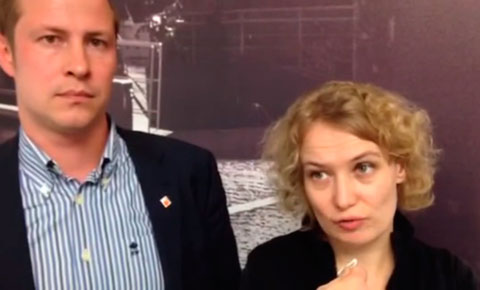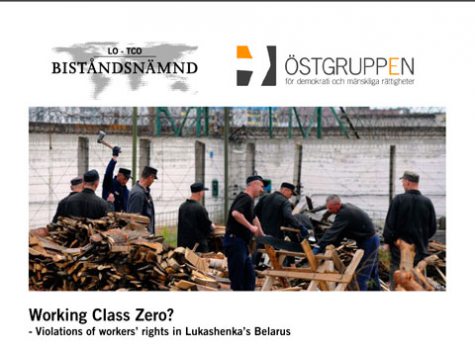Belarus has “lowest respect for labor rights, trade union rights” in Customs Union (video)

Anton Leppik, International Trade Union Confederation (ITUC) and Sacha Koulaeva, head of the FIDH’s Eastern Europe and Central Asia Desk
Belarus has demonstrated the lowest level of respect for labor and trade union rights within the Customs Union, says Anton Leppik, representative of the International Trade Union Confederation (ITUC), who participated in the discussion of the joint report of the International Federation for Human Rights (FIDH) and the Human Rights Center “Viasna” “Forced Labor and Pervasive Violations of Workers’ Rights in Belarus”, held this month in Stockholm at the initiative of Swedish human rights defenders.
“Working Class Zero? Violations of Workers’ Rights in Lukashenka’s Belarus” was the name of a seminar organized by the human rights organization Ostgruppen, which was attended by Valiantsin Stefanovich, deputy head of the HRC “Viasna”, Sacha Koulaeva, head of the FIDH’s Eastern Europe and Central Asia Desk, Martin Uggla, Ostgruppen chairman, Anton Leppik, representative of the International Trade Union Confederation (ITUC).
 When presenting the results of an international field mission that visited several regions of Belarus in June 2013, representatives of FIDH and “Viasna” told about the drawbacks of the contract system for workers, forced labor and the situation with independent trade unions. The seminar participants raised the question of how to act outside Belarus against the Lukashenka regime in order to change the situation of Belarusian workers and provide support to independent trade union movement in Belarus.
When presenting the results of an international field mission that visited several regions of Belarus in June 2013, representatives of FIDH and “Viasna” told about the drawbacks of the contract system for workers, forced labor and the situation with independent trade unions. The seminar participants raised the question of how to act outside Belarus against the Lukashenka regime in order to change the situation of Belarusian workers and provide support to independent trade union movement in Belarus.
Sacha Koulaeva and Anton Leppik shared their views on the matter in an interview with Swedish journalists (see video below).
Sacha Koulaeva: I think that the measures to improve the situation are very limited nowadays, because the government of Lukashenka is not receptive at all to the international critics, if it’s not for the ILO sanctions or influence. However, I think that informing on the violations of economic and social rights and the elements of forced labor, which are wide-spread in Belarus, is a very important part of the work that should be done, because it also concerns the private companies which work with Belarus. It also concerns the international trade unions which work with Belarusian trade unions, who should know that membership in a state trade union in Belarus is almost obligatory, and you can lose the work not only for joining the other, independent trade union, but just by the decision of quitting the official one. It’s a real repressive system where all the elements are put together to influence and to control the population. And these elements should be known by those who buy wood from Belarus, knowing that there is a special decree on wood-cutting industry, which actually forbids people to leave their jobs. For those who buy goods or buy reworked petrol from Belarus, while all the workers are under the short contract and in a completely dependent position. All these elements should be first of all known. For the moment, they are largely unknown. And there is a big part of responsibility and work on the trade unions on the international level, who have the luxury to speak freely and who should do that to help their Belarusian partners.
Anton Leppik: I should say that there are several ways, and we are doing these ways, we are doing this work. First of all, we should continue working with the International Labor Organization, where Western unions have stake… to raise the Belarusian question there, related to freedom of association. But we indeed can have more awareness about these forced labor practices in general and in specific situations like presented in the report. I think this should also be brought, in addition to freedom of association issue, to the ILO agenda. Because the government is at least pretending to be interested in dialog with the ILO. The second is indeed raising awareness within the European Union, but not only. Also, in other countries. That’s indeed when a company, business is investing or trying to build partnership with Belarusian, let’s name, company. In fact, state, let’s put it like this. That they should be aware that they are in a way contributing to keeping, prolonging this serfdom system. And one more is, of course, trade union solidarity. We are doing this and in terms of Belarus I think that now it’s very important to make sure that there is a consolidated trade union response to the situation in so-called Customs Union. In particular, in Russia. And Russian unions are doing this, they sign agreements with small independent unions in Belarus, with the Belarusian Congress of Democratic Trade Unions, to act together, because the approximation of legislation might be coming, and of course there is vested interest from the Russian unions not to get to the situation like in Belarus, which is I would say the lowest respect for labor rights, trade union rights in this Customs Union.
The report by the FIDH and the Human Rights Center “Viasna” was presented in the UN Committee on Economic, Social and Cultural Rights. And the Committee in its concluding observations on the periodic reports of Belarus’ implementation of the International Covenant on Economic, Social and Cultural Rights touched upon the issue of forced labor and violations of labor rights, which was raised in the report. In particular, the Committee explicitly urged Belarus to revise the system of short-term contracts, to abolish forced labor of those with drug and alcohol addiction and “obligated persons”, to review the applicable legislation, to ensure free work of trade unions and to take a number of positive steps to ensure the effective and efficient social protection of people’s rights.


















